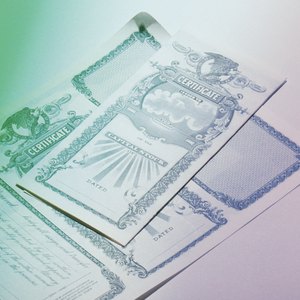
Most stock transactions are handled electronically. You can buy or sell shares of a stock without ever actually having an actual paper certificate in your possession that establishes your ownership of the shares. Instead, modern brokerages provide regular account statements as an indication of your stock holdings. If you own paper stock certificates, you can convert these into electronic records.
Stock Certificates
All stock trading used to be conducted with paper certificates. The certificates were proof of stock ownership and had to be handled like cash or other financial securities. If you have paper stock certificates and lose them, you may not be able to readily sell your shares of stock, and you might be charged a substantial fee for replacing the certificates. For this reason, many people who have paper stock certificates keep them in bank safety deposit boxes.
Book-Entry Securities
Most current stock trading is paperless, a form of trading known as book entry. Your ownership of shares of a stock is recorded in the books of a brokerage house. Your broker sends you regular accounting statements detailing the number of shares you own and the value of the shares.
Converting Paper
Paper stock certificates can be converted into book-entry accounts. This generally involves delivering the certificates to your broker with a request to add them electronically to your account. You may have to sign the certificates in order to make the conversion. Your brokerage may also have its own specific forms or procedures for the conversion process. Check with your broker for details.
Transfer Agents
Some stock owners deal directly with transfer agents, which are firms that manage a company's stock transactions, rather than brokerages. A transfer agent keeps a record of all shareholders of a company's stock and the number of shares each shareholder owns. Your transfer agent can also convert paper shares to a book-entry account.
References
Writer Bio
David Sarokin is a well-known specialist on Internet research. He has been profiled in the "New York Times," the "Washington Post" and in numerous online publications. Based in Washington D.C., he splits his time between several research services, writing content and his work as an environmental specialist with the federal government. David is the author of Missed Information (MIT Press, 2016), a book exploring how better information can lead to a more sustainable future.
